Antibody data
- Antibody Data
- Antigen structure
- References [66]
- Comments [0]
- Validations
- Western blot [3]
- Immunocytochemistry [2]
- Immunohistochemistry [1]
- Flow cytometry [2]
Submit
Validation data
Reference
Comment
Report error
- Product number
- MA5-13506 - Provider product page

- Provider
- Invitrogen Antibodies
- Product name
- MGMT Monoclonal Antibody (MT 3.1)
- Antibody type
- Monoclonal
- Antigen
- Purifed from natural sources
- Description
- MA5-13506 targets MGMT (O-methylguanine-DNA methyltransferase) in FACS, ICC/IF, IHC (P), and WB applications and shows reactivity with Human samples. The MA5-13506 immunogen is purified recombinant human MGMT protein.
- Reactivity
- Human
- Host
- Mouse
- Isotype
- IgG
- Antibody clone number
- MT 3.1
- Vial size
- 500 µL
- Concentration
- 0.4 mg/mL
- Storage
- 4° C
Submitted references The effect of diet and exercise on tobacco carcinogen-induced lung cancer.
Nimotuzumab enhances temozolomide-induced growth suppression of glioma cells expressing mutant EGFR in vivo.
Inhibition of Human Adrenocortical Cancer Cell Growth by Temozolomide in Vitro and the Role of the MGMT Gene.
Immunohistochemical staining for p16 and BRAFV600E is useful to distinguish between sporadic and hereditary (Lynch syndrome-related) microsatellite instable colorectal carcinomas.
Evaluation of novel imidazotetrazine analogues designed to overcome temozolomide resistance and glioblastoma regrowth.
The prognostic impact of MGMT expression on low-grade gangliogliomas: a clinicopathological and immunohistochemical study.
The prognostic impact of MGMT expression on low-grade gangliogliomas: a clinicopathological and immunohistochemical study.
Correlation of histomorphologic prognostic markers and proliferative index with loss of heterozygosity 1p/19q and MGMT status in diffusely infiltrating gliomas.
Clinicopathological features of human brainstem gliomas.
Exclusion of histiocytes/endothelial cells and using endothelial cells as internal reference are crucial for interpretation of MGMT immunohistochemistry in glioblastoma.
Infratentorial low-grade oligoastrocytoma with aggressive clinical behavior in an adult: a case report with genetic characterization.
The Changes in MGMT Promoter Methylation Status in Initial and Recurrent Glioblastomas.
The Changes in MGMT Promoter Methylation Status in Initial and Recurrent Glioblastomas.
MGMT promoter hypermethylation and its associations with genetic alterations in a series of 350 brain tumors.
Immunohistochemical detection of IDH1 mutation, p53, and internexin as prognostic factors of glial tumors.
O-6-methylguanine-DNA methyltransferase (MGMT) immunohistochemical expression in pituitary corticotroph adenomas.
Correlation of MGMT promoter methylation status with gene and protein expression levels in glioblastoma.
The prognostic impact of O6-methylguanine DNA methyltransferase and epidermal growth factor receptor expressions on primary gliosarcoma: a clinicopathologic and immunohistochemical study of seven cases at a single institution.
Expression of O⁶-methylguanine-DNA methyltransferase in childhood medulloblastoma.
Differential hypermethylation of genes in vulvar cancer and lichen sclerosus coexisting or not with vulvar cancer.
O6-Methylguanine-DNA methyltransferase protein expression by immunohistochemistry in brain and non-brain systemic tumours: systematic review and meta-analysis of correlation with methylation-specific polymerase chain reaction.
Quantitative digital assessment of MGMT immunohistochemical expression in glioblastoma tissue.
Usefulness of MS-MLPA for detection of MGMT promoter methylation in the evaluation of pseudoprogression in glioblastoma patients.
The status of MGMT protein expression is a prognostic factor for meningeal hemangiopericytoma: a clinicopathologic and immunohistochemical study of 12 cases at a single institution.
Evaluation of O6-methylguanine-DNA methyltransferase by immunohistochemistry: best clinical and research practices.
Detection of IDH1 mutation in human gliomas: comparison of immunohistochemistry and sequencing.
Brain metastasis of undifferentiated sarcoma and response to temozolomide treatment. Case report.
Brain metastasis of undifferentiated sarcoma and response to temozolomide treatment. Case report.
Methylation tolerance due to an O6-methylguanine DNA methyltransferase (MGMT) field defect in the colonic mucosa: an initiating step in the development of mismatch repair-deficient colorectal cancers.
O(6)-Methylguanine-DNA methyltransferase expression and prognostic value in brain metastases of lung cancers.
Loss expression of O6-methylguanine DNA methyltransferase by promoter hypermethylation and its relationship to betel quid chewing in oral squamous cell carcinoma.
Methylguanine DNA methyltransferase-mediated drug resistance-based selective enrichment and engraftment of transplanted stem cells in skeletal muscle.
Correlation among pathology, genetic and epigenetic profiles, and clinical outcome in oligodendroglial tumors.
Inactivation of O6-methylguanine-DNA methyltransferase in soft tissue sarcomas: association with K-ras mutations.
MGMT promoter hypermethylation in a series of 104 glioblastomas.
MSH6 mutations arise in glioblastomas during temozolomide therapy and mediate temozolomide resistance.
O6-methylguanine DNA methyltransferase deficiency and response to temozolomide-based therapy in patients with neuroendocrine tumors.
Infrequent promoter methylation of the MGMT gene in liver metastases from uveal melanoma.
Anti-O6-methylguanine-methyltransferase (MGMT) immunohistochemistry in glioblastoma multiforme: observer variability and lack of association with patient survival impede its use as clinical biomarker.
Aberrant crypt foci in the adenoma prevention with celecoxib trial.
IFN-beta sensitizes neuroblastoma to the antitumor activity of temozolomide by modulating O6-methylguanine DNA methyltransferase expression.
Prospective trial of gross-total resection with Gliadel wafers followed by early postoperative Gamma Knife radiosurgery and conformal fractionated radiotherapy as the initial treatment for patients with radiographically suspected, newly diagnosed glioblastoma multiforme.
Differential DNA methylation associated with hepatitis B virus infection in hepatocellular carcinoma.
Molecular analysis of colorectal cancer tumors from patients with mismatch repair proficient hereditary nonpolyposis colorectal cancer suggests novel carcinogenic pathways.
Molecular correlates with MGMT promoter methylation and silencing support CpG island methylator phenotype-low (CIMP-low) in colorectal cancer.
Prognostic significance of loss of O6-methylguanine-DNA methyltransferase expression in supratentorial diffuse low-grade astrocytoma.
Prognostic significance of O6-methylguanine-DNA methyltransferase protein expression in patients with recurrent glioblastoma treated with temozolomide.
Effectiveness of interferon-beta and temozolomide combination therapy against temozolomide-refractory recurrent anaplastic astrocytoma.
Protective effect of O6-methylguanine-DNA-methyltransferase on mammalian cells.
Characterisation of a P140K mutant O6-methylguanine-DNA-methyltransferase (MGMT)-expressing transgenic mouse line with drug-selectable bone marrow.
The prognostic impact of O6-Methylguanine-DNA Methyltransferase (MGMT) promotor hypermethylation in esophageal adenocarcinoma.
Mutually exclusive promoter hypermethylation patterns of hMLH1 and O6-methylguanine DNA methyltransferase in colorectal cancer.
Genetic instability on chromosome 17 in the epithelium of non-polypoid colorectal carcinomas compared to polypoid lesions.
Postchemotherapy characteristics of hepatic colorectal metastases: remnants of uncertain malignant potential.
O(6)-methylguanine methyltransferase in colorectal cancers: detection of mutations, loss of expression, and weak association with G:C>A:T transitions.
Demographic and pathological characteristics of serrated polyps of colorectum.
Prognostic significance of O6-methylguanine-DNA methyltransferase determined by promoter hypermethylation and immunohistochemical expression in anaplastic gliomas.
Inactivation of the DNA repair gene O6-methylguanine-DNA methyltransferase by promoter hypermethylation and its relationship to aflatoxin B1-DNA adducts and p53 mutation in hepatocellular carcinoma.
Degradation of the alkylated form of the DNA repair protein, O(6)-alkylguanine-DNA alkyltransferase.
Degradation of the alkylated form of the DNA repair protein, O(6)-alkylguanine-DNA alkyltransferase.
Improvement of combination chemotherapy tolerance by introduction of polycistronic retroviral vector drug resistance genes MGMT and MDR1 into human umbilical cord blood CD34+ cells.
Improvement of combination chemotherapy tolerance by introduction of polycistronic retroviral vector drug resistance genes MGMT and MDR1 into human umbilical cord blood CD34+ cells.
Inactivation and degradation of O(6)-alkylguanine-DNA alkyltransferase after reaction with nitric oxide.
Modulation of 1,3-bis-(2-chloroethyl)-1-nitrosourea resistance in human tumor cells using hammerhead ribozymes designed to degrade O6-methylguanine DNA methyltransferase mRNA.
Reduction of BCNU toxicity to lung cells by high-level expression of O(6)-methylguanine-DNA methyltransferase.
Reduction of BCNU toxicity to lung cells by high-level expression of O(6)-methylguanine-DNA methyltransferase.
Elisia I, Cho B, Hay M, Li MY, Hofs E, Lam V, Dyer RA, Lum J, Krystal G
Carcinogenesis 2019 May 14;40(3):448-460
Carcinogenesis 2019 May 14;40(3):448-460
Nimotuzumab enhances temozolomide-induced growth suppression of glioma cells expressing mutant EGFR in vivo.
Nitta Y, Shimizu S, Shishido-Hara Y, Suzuki K, Shiokawa Y, Nagane M
Cancer medicine 2016 Mar;5(3):486-99
Cancer medicine 2016 Mar;5(3):486-99
Inhibition of Human Adrenocortical Cancer Cell Growth by Temozolomide in Vitro and the Role of the MGMT Gene.
Creemers SG, van Koetsveld PM, van den Dungen ES, Korpershoek E, van Kemenade FJ, Franssen GJ, de Herder WW, Feelders RA, Hofland LJ
The Journal of clinical endocrinology and metabolism 2016 Dec;101(12):4574-4584
The Journal of clinical endocrinology and metabolism 2016 Dec;101(12):4574-4584
Immunohistochemical staining for p16 and BRAFV600E is useful to distinguish between sporadic and hereditary (Lynch syndrome-related) microsatellite instable colorectal carcinomas.
Boissière-Michot F, Frugier H, Ho-Pun-Cheung A, Lopez-Crapez E, Duffour J, Bibeau F
Virchows Archiv : an international journal of pathology 2016 Aug;469(2):135-44
Virchows Archiv : an international journal of pathology 2016 Aug;469(2):135-44
Evaluation of novel imidazotetrazine analogues designed to overcome temozolomide resistance and glioblastoma regrowth.
Ramirez YP, Mladek AC, Phillips RM, Gynther M, Rautio J, Ross AH, Wheelhouse RT, Sakaria JN
Molecular cancer therapeutics 2015 Jan;14(1):111-9
Molecular cancer therapeutics 2015 Jan;14(1):111-9
The prognostic impact of MGMT expression on low-grade gangliogliomas: a clinicopathological and immunohistochemical study.
Chang IW, Hsu CT, Lin JW, Hung CH
Folia neuropathologica 2013;51(4):275-82
Folia neuropathologica 2013;51(4):275-82
The prognostic impact of MGMT expression on low-grade gangliogliomas: a clinicopathological and immunohistochemical study.
Chang IW, Hsu CT, Lin JW, Hung CH
Folia neuropathologica 2013;51(4):275-82
Folia neuropathologica 2013;51(4):275-82
Correlation of histomorphologic prognostic markers and proliferative index with loss of heterozygosity 1p/19q and MGMT status in diffusely infiltrating gliomas.
Deb P, Mani NS, Sudumbrekar SM, Taneja N, Patrikar S
Medical journal, Armed Forces India 2013 Jul;69(3):228-36
Medical journal, Armed Forces India 2013 Jul;69(3):228-36
Clinicopathological features of human brainstem gliomas.
Oka H, Utsuki S, Tanizaki Y, Hagiwara H, Miyajima Y, Sato K, Kusumi M, Kijima C, Fujii K
Brain tumor pathology 2013 Jan;30(1):1-7
Brain tumor pathology 2013 Jan;30(1):1-7
Exclusion of histiocytes/endothelial cells and using endothelial cells as internal reference are crucial for interpretation of MGMT immunohistochemistry in glioblastoma.
Hsu CY, Lin SC, Ho HL, Chang-Chien YC, Hsu SP, Yen YS, Chen MH, Guo WY, Ho DM
The American journal of surgical pathology 2013 Feb;37(2):264-71
The American journal of surgical pathology 2013 Feb;37(2):264-71
Infratentorial low-grade oligoastrocytoma with aggressive clinical behavior in an adult: a case report with genetic characterization.
Sano K, Toda M, Sasaki H, Kitamura Y, Mikami S, Hirato J, Inoue S, Kawase T, Yoshida K
Brain tumor pathology 2013 Apr;30(2):99-103
Brain tumor pathology 2013 Apr;30(2):99-103
The Changes in MGMT Promoter Methylation Status in Initial and Recurrent Glioblastomas.
Park CK, Kim JE, Kim JY, Song SW, Kim JW, Choi SH, Kim TM, Lee SH, Kim IH, Park SH
Translational oncology 2012 Oct;5(5):393-7
Translational oncology 2012 Oct;5(5):393-7
The Changes in MGMT Promoter Methylation Status in Initial and Recurrent Glioblastomas.
Park CK, Kim JE, Kim JY, Song SW, Kim JW, Choi SH, Kim TM, Lee SH, Kim IH, Park SH
Translational oncology 2012 Oct;5(5):393-7
Translational oncology 2012 Oct;5(5):393-7
MGMT promoter hypermethylation and its associations with genetic alterations in a series of 350 brain tumors.
Mellai M, Monzeglio O, Piazzi A, Caldera V, Annovazzi L, Cassoni P, Valente G, Cordera S, Mocellini C, Schiffer D
Journal of neuro-oncology 2012 May;107(3):617-31
Journal of neuro-oncology 2012 May;107(3):617-31
Immunohistochemical detection of IDH1 mutation, p53, and internexin as prognostic factors of glial tumors.
Takano S, Kato Y, Yamamoto T, Kaneko MK, Ishikawa E, Tsujimoto Y, Matsuda M, Nakai K, Yanagiya R, Morita S, Tsuboi K, Matsumura A
Journal of neuro-oncology 2012 Jul;108(3):361-73
Journal of neuro-oncology 2012 Jul;108(3):361-73
O-6-methylguanine-DNA methyltransferase (MGMT) immunohistochemical expression in pituitary corticotroph adenomas.
Salehi F, Scheithauer BW, Kovacs K, Horvath E, Syro LV, Sharma S, Manoranjan B, Cusimano M
Neurosurgery 2012 Feb;70(2):491-6; discussion 496
Neurosurgery 2012 Feb;70(2):491-6; discussion 496
Correlation of MGMT promoter methylation status with gene and protein expression levels in glioblastoma.
Uno M, Oba-Shinjo SM, Camargo AA, Moura RP, Aguiar PH, Cabrera HN, Begnami M, Rosemberg S, Teixeira MJ, Marie SK
Clinics (Sao Paulo, Brazil) 2011;66(10):1747-55
Clinics (Sao Paulo, Brazil) 2011;66(10):1747-55
The prognostic impact of O6-methylguanine DNA methyltransferase and epidermal growth factor receptor expressions on primary gliosarcoma: a clinicopathologic and immunohistochemical study of seven cases at a single institution.
Lin JW, Wu YT, Chang IW
Indian journal of pathology & microbiology 2011 Oct-Dec;54(4):683-7
Indian journal of pathology & microbiology 2011 Oct-Dec;54(4):683-7
Expression of O⁶-methylguanine-DNA methyltransferase in childhood medulloblastoma.
Faoro D, von Bueren AO, Shalaby T, Sciuscio D, Hürlimann ML, Arnold L, Gerber NU, Haybaeck J, Mittelbronn M, Rutkowski S, Hegi M, Grotzer MA
Journal of neuro-oncology 2011 May;103(1):59-69
Journal of neuro-oncology 2011 May;103(1):59-69
Differential hypermethylation of genes in vulvar cancer and lichen sclerosus coexisting or not with vulvar cancer.
Guerrero D, Guarch R, Ojer A, Casas JM, Méndez-Meca C, Esteller M, Barba-Ramos E, Garcia-Bragado F, Puras A
International journal of cancer 2011 Jun 15;128(12):2853-64
International journal of cancer 2011 Jun 15;128(12):2853-64
O6-Methylguanine-DNA methyltransferase protein expression by immunohistochemistry in brain and non-brain systemic tumours: systematic review and meta-analysis of correlation with methylation-specific polymerase chain reaction.
Brell M, Ibáñez J, Tortosa A
BMC cancer 2011 Jan 26;11:35
BMC cancer 2011 Jan 26;11:35
Quantitative digital assessment of MGMT immunohistochemical expression in glioblastoma tissue.
Araki Y, Mizoguchi M, Yoshimoto K, Shono T, Amano T, Nakamizo A, Suzuki SO, Iwaki T, Sasaki T
Brain tumor pathology 2011 Feb;28(1):25-31
Brain tumor pathology 2011 Feb;28(1):25-31
Usefulness of MS-MLPA for detection of MGMT promoter methylation in the evaluation of pseudoprogression in glioblastoma patients.
Park CK, Kim J, Yim SY, Lee AR, Han JH, Kim CY, Park SH, Kim TM, Lee SH, Choi SH, Kim SK, Kim DG, Jung HW
Neuro-oncology 2011 Feb;13(2):195-202
Neuro-oncology 2011 Feb;13(2):195-202
The status of MGMT protein expression is a prognostic factor for meningeal hemangiopericytoma: a clinicopathologic and immunohistochemical study of 12 cases at a single institution.
Chang IW, Lin JW, Wu YT
Journal of neuro-oncology 2011 Dec;105(3):563-72
Journal of neuro-oncology 2011 Dec;105(3):563-72
Evaluation of O6-methylguanine-DNA methyltransferase by immunohistochemistry: best clinical and research practices.
Neto JC, Carvalho K, Olivieri E, Carraro D, Cunha I, Vassallo J, Kagohara L, Soares F, Rocha R
Pathology, research and practice 2011 Aug 15;207(8):492-7
Pathology, research and practice 2011 Aug 15;207(8):492-7
Detection of IDH1 mutation in human gliomas: comparison of immunohistochemistry and sequencing.
Takano S, Tian W, Matsuda M, Yamamoto T, Ishikawa E, Kaneko MK, Yamazaki K, Kato Y, Matsumura A
Brain tumor pathology 2011 Apr;28(2):115-23
Brain tumor pathology 2011 Apr;28(2):115-23
Brain metastasis of undifferentiated sarcoma and response to temozolomide treatment. Case report.
Tanaka H, Sasayama T, Nishihara M, Arai A, Kawamura A, Kanomata N, Itoh T, Kohmura E
Neurologia medico-chirurgica 2010;50(8):689-93
Neurologia medico-chirurgica 2010;50(8):689-93
Brain metastasis of undifferentiated sarcoma and response to temozolomide treatment. Case report.
Tanaka H, Sasayama T, Nishihara M, Arai A, Kawamura A, Kanomata N, Itoh T, Kohmura E
Neurologia medico-chirurgica 2010;50(8):689-93
Neurologia medico-chirurgica 2010;50(8):689-93
Methylation tolerance due to an O6-methylguanine DNA methyltransferase (MGMT) field defect in the colonic mucosa: an initiating step in the development of mismatch repair-deficient colorectal cancers.
Svrcek M, Buhard O, Colas C, Coulet F, Dumont S, Massaoudi I, Lamri A, Hamelin R, Cosnes J, Oliveira C, Seruca R, Gaub MP, Legrain M, Collura A, Lascols O, Tiret E, Fléjou JF, Duval A
Gut 2010 Nov;59(11):1516-26
Gut 2010 Nov;59(11):1516-26
O(6)-Methylguanine-DNA methyltransferase expression and prognostic value in brain metastases of lung cancers.
Wu PF, Kuo KT, Kuo LT, Lin YT, Lee WC, Lu YS, Yang CH, Wu RM, Tu YK, Tasi JC, Tseng HM, Tseng SH, Cheng AL, Lin CH
Lung cancer (Amsterdam, Netherlands) 2010 Jun;68(3):484-90
Lung cancer (Amsterdam, Netherlands) 2010 Jun;68(3):484-90
Loss expression of O6-methylguanine DNA methyltransferase by promoter hypermethylation and its relationship to betel quid chewing in oral squamous cell carcinoma.
Huang SH, Lee HS, Mar K, Ji DD, Huang MS, Hsia KT
Oral surgery, oral medicine, oral pathology, oral radiology, and endodontics 2010 Jun;109(6):883-9
Oral surgery, oral medicine, oral pathology, oral radiology, and endodontics 2010 Jun;109(6):883-9
Methylguanine DNA methyltransferase-mediated drug resistance-based selective enrichment and engraftment of transplanted stem cells in skeletal muscle.
Lee AS, Kahatapitiya P, Kramer B, Joya JE, Hook J, Liu R, Schevzov G, Alexander IE, McCowage G, Montarras D, Gunning PW, Hardeman EC
Stem cells (Dayton, Ohio) 2009 May;27(5):1098-108
Stem cells (Dayton, Ohio) 2009 May;27(5):1098-108
Correlation among pathology, genetic and epigenetic profiles, and clinical outcome in oligodendroglial tumors.
Kuo LT, Kuo KT, Lee MJ, Wei CC, Scaravilli F, Tsai JC, Tseng HM, Kuo MF, Tu YK
International journal of cancer 2009 Jun 15;124(12):2872-9
International journal of cancer 2009 Jun 15;124(12):2872-9
Inactivation of O6-methylguanine-DNA methyltransferase in soft tissue sarcomas: association with K-ras mutations.
Kim JI, Suh JT, Choi KU, Kang HJ, Shin DH, Lee IS, Moon TY, Kim WT
Human pathology 2009 Jul;40(7):934-41
Human pathology 2009 Jul;40(7):934-41
MGMT promoter hypermethylation in a series of 104 glioblastomas.
Mellai M, Caldera V, Annovazzi L, Chiò A, Lanotte M, Cassoni P, Finocchiaro G, Schiffer D
Cancer genomics & proteomics 2009 Jul-Aug;6(4):219-27
Cancer genomics & proteomics 2009 Jul-Aug;6(4):219-27
MSH6 mutations arise in glioblastomas during temozolomide therapy and mediate temozolomide resistance.
Yip S, Miao J, Cahill DP, Iafrate AJ, Aldape K, Nutt CL, Louis DN
Clinical cancer research : an official journal of the American Association for Cancer Research 2009 Jul 15;15(14):4622-9
Clinical cancer research : an official journal of the American Association for Cancer Research 2009 Jul 15;15(14):4622-9
O6-methylguanine DNA methyltransferase deficiency and response to temozolomide-based therapy in patients with neuroendocrine tumors.
Kulke MH, Hornick JL, Frauenhoffer C, Hooshmand S, Ryan DP, Enzinger PC, Meyerhardt JA, Clark JW, Stuart K, Fuchs CS, Redston MS
Clinical cancer research : an official journal of the American Association for Cancer Research 2009 Jan 1;15(1):338-45
Clinical cancer research : an official journal of the American Association for Cancer Research 2009 Jan 1;15(1):338-45
Infrequent promoter methylation of the MGMT gene in liver metastases from uveal melanoma.
Voelter V, Diserens AC, Moulin A, Nagel G, Yan P, Migliavacca E, Rimoldi D, Hamou MF, Kaina B, Leyvraz S, Hegi ME
International journal of cancer 2008 Sep 1;123(5):1215-8
International journal of cancer 2008 Sep 1;123(5):1215-8
Anti-O6-methylguanine-methyltransferase (MGMT) immunohistochemistry in glioblastoma multiforme: observer variability and lack of association with patient survival impede its use as clinical biomarker.
Preusser M, Charles Janzer R, Felsberg J, Reifenberger G, Hamou MF, Diserens AC, Stupp R, Gorlia T, Marosi C, Heinzl H, Hainfellner JA, Hegi M
Brain pathology (Zurich, Switzerland) 2008 Oct;18(4):520-32
Brain pathology (Zurich, Switzerland) 2008 Oct;18(4):520-32
Aberrant crypt foci in the adenoma prevention with celecoxib trial.
Cho NL, Redston M, Zauber AG, Carothers AM, Hornick J, Wilton A, Sontag S, Nishioka N, Giardiello FM, Saltzman JR, Gostout C, Eagle CJ, Hawk ET, Bertagnolli MM
Cancer prevention research (Philadelphia, Pa.) 2008 Jun;1(1):21-31
Cancer prevention research (Philadelphia, Pa.) 2008 Jun;1(1):21-31
IFN-beta sensitizes neuroblastoma to the antitumor activity of temozolomide by modulating O6-methylguanine DNA methyltransferase expression.
Rosati SF, Williams RF, Nunnally LC, McGee MC, Sims TL, Tracey L, Zhou J, Fan M, Ng CY, Nathwani AC, Stewart CF, Pfeffer LM, Davidoff AM
Molecular cancer therapeutics 2008 Dec;7(12):3852-8
Molecular cancer therapeutics 2008 Dec;7(12):3852-8
Prospective trial of gross-total resection with Gliadel wafers followed by early postoperative Gamma Knife radiosurgery and conformal fractionated radiotherapy as the initial treatment for patients with radiographically suspected, newly diagnosed glioblastoma multiforme.
Smith KA, Ashby LS, Gonzalez LF, Brachman DG, Thomas T, Coons SW, Battaglia M, Scheck A
Journal of neurosurgery 2008 Dec;109 Suppl:106-17
Journal of neurosurgery 2008 Dec;109 Suppl:106-17
Differential DNA methylation associated with hepatitis B virus infection in hepatocellular carcinoma.
Su PF, Lee TC, Lin PJ, Lee PH, Jeng YM, Chen CH, Liang JD, Chiou LL, Huang GT, Lee HS
International journal of cancer 2007 Sep 15;121(6):1257-64
International journal of cancer 2007 Sep 15;121(6):1257-64
Molecular analysis of colorectal cancer tumors from patients with mismatch repair proficient hereditary nonpolyposis colorectal cancer suggests novel carcinogenic pathways.
Sánchez-de-Abajo A, de la Hoya M, van Puijenbroek M, Tosar A, López-Asenjo JA, Díaz-Rubio E, Morreau H, Caldes T
Clinical cancer research : an official journal of the American Association for Cancer Research 2007 Oct 1;13(19):5729-35
Clinical cancer research : an official journal of the American Association for Cancer Research 2007 Oct 1;13(19):5729-35
Molecular correlates with MGMT promoter methylation and silencing support CpG island methylator phenotype-low (CIMP-low) in colorectal cancer.
Ogino S, Kawasaki T, Kirkner GJ, Suemoto Y, Meyerhardt JA, Fuchs CS
Gut 2007 Nov;56(11):1564-71
Gut 2007 Nov;56(11):1564-71
Prognostic significance of loss of O6-methylguanine-DNA methyltransferase expression in supratentorial diffuse low-grade astrocytoma.
Nakasu S, Fukami T, Jito J, Matsuda M
Surgical neurology 2007 Dec;68(6):603-608
Surgical neurology 2007 Dec;68(6):603-608
Prognostic significance of O6-methylguanine-DNA methyltransferase protein expression in patients with recurrent glioblastoma treated with temozolomide.
Nagane M, Kobayashi K, Ohnishi A, Shimizu S, Shiokawa Y
Japanese journal of clinical oncology 2007 Dec;37(12):897-906
Japanese journal of clinical oncology 2007 Dec;37(12):897-906
Effectiveness of interferon-beta and temozolomide combination therapy against temozolomide-refractory recurrent anaplastic astrocytoma.
Fujimaki T, Ishii H, Matsuno A, Arai H, Nakagomi T
World journal of surgical oncology 2007 Aug 4;5:89
World journal of surgical oncology 2007 Aug 4;5:89
Protective effect of O6-methylguanine-DNA-methyltransferase on mammalian cells.
Li DB, Wang JS, Fang Q, Sun HY, Xu W, Li WD
Chinese medical journal 2007 Apr 20;120(8):714-7
Chinese medical journal 2007 Apr 20;120(8):714-7
Characterisation of a P140K mutant O6-methylguanine-DNA-methyltransferase (MGMT)-expressing transgenic mouse line with drug-selectable bone marrow.
Kramer BA, Lemckert FA, Alexander IE, Gunning PW, McCowage GB
The journal of gene medicine 2006 Sep;8(9):1071-85
The journal of gene medicine 2006 Sep;8(9):1071-85
The prognostic impact of O6-Methylguanine-DNA Methyltransferase (MGMT) promotor hypermethylation in esophageal adenocarcinoma.
Baumann S, Keller G, Pühringer F, Napieralski R, Feith M, Langer R, Höfler H, Stein HJ, Sarbia M
International journal of cancer 2006 Jul 15;119(2):264-8
International journal of cancer 2006 Jul 15;119(2):264-8
Mutually exclusive promoter hypermethylation patterns of hMLH1 and O6-methylguanine DNA methyltransferase in colorectal cancer.
Fox EJ, Leahy DT, Geraghty R, Mulcahy HE, Fennelly D, Hyland JM, O'Donoghue DP, Sheahan K
The Journal of molecular diagnostics : JMD 2006 Feb;8(1):68-75
The Journal of molecular diagnostics : JMD 2006 Feb;8(1):68-75
Genetic instability on chromosome 17 in the epithelium of non-polypoid colorectal carcinomas compared to polypoid lesions.
Ogawa T, Yoshida T, Tsuruta T, Saigenji K, Okayasu I
Cancer science 2006 Dec;97(12):1335-42
Cancer science 2006 Dec;97(12):1335-42
Postchemotherapy characteristics of hepatic colorectal metastases: remnants of uncertain malignant potential.
Znajda TL, Hayashi S, Horton PJ, Martinie JB, Chaudhury P, Marcus VA, Jass JR, Metrakos P
Journal of gastrointestinal surgery : official journal of the Society for Surgery of the Alimentary Tract 2006 Apr;10(4):483-9
Journal of gastrointestinal surgery : official journal of the Society for Surgery of the Alimentary Tract 2006 Apr;10(4):483-9
O(6)-methylguanine methyltransferase in colorectal cancers: detection of mutations, loss of expression, and weak association with G:C>A:T transitions.
Halford S, Rowan A, Sawyer E, Talbot I, Tomlinson I
Gut 2005 Jun;54(6):797-802
Gut 2005 Jun;54(6):797-802
Demographic and pathological characteristics of serrated polyps of colorectum.
Higuchi T, Sugihara K, Jass JR
Histopathology 2005 Jul;47(1):32-40
Histopathology 2005 Jul;47(1):32-40
Prognostic significance of O6-methylguanine-DNA methyltransferase determined by promoter hypermethylation and immunohistochemical expression in anaplastic gliomas.
Brell M, Tortosa A, Verger E, Gil JM, Viñolas N, Villá S, Acebes JJ, Caral L, Pujol T, Ferrer I, Ribalta T, Graus F
Clinical cancer research : an official journal of the American Association for Cancer Research 2005 Jul 15;11(14):5167-74
Clinical cancer research : an official journal of the American Association for Cancer Research 2005 Jul 15;11(14):5167-74
Inactivation of the DNA repair gene O6-methylguanine-DNA methyltransferase by promoter hypermethylation and its relationship to aflatoxin B1-DNA adducts and p53 mutation in hepatocellular carcinoma.
Zhang YJ, Chen Y, Ahsan H, Lunn RM, Lee PH, Chen CJ, Santella RM
International journal of cancer 2003 Feb 10;103(4):440-4
International journal of cancer 2003 Feb 10;103(4):440-4
Degradation of the alkylated form of the DNA repair protein, O(6)-alkylguanine-DNA alkyltransferase.
Xu-Welliver M, Pegg AE
Carcinogenesis 2002 May;23(5):823-30
Carcinogenesis 2002 May;23(5):823-30
Degradation of the alkylated form of the DNA repair protein, O(6)-alkylguanine-DNA alkyltransferase.
Xu-Welliver M, Pegg AE
Carcinogenesis 2002 May;23(5):823-30
Carcinogenesis 2002 May;23(5):823-30
Improvement of combination chemotherapy tolerance by introduction of polycistronic retroviral vector drug resistance genes MGMT and MDR1 into human umbilical cord blood CD34+ cells.
Wang J, Chen Z, Xia X, Lu D, Xue J, Ruan C
Leukemia research 2002 Mar;26(3):281-8
Leukemia research 2002 Mar;26(3):281-8
Improvement of combination chemotherapy tolerance by introduction of polycistronic retroviral vector drug resistance genes MGMT and MDR1 into human umbilical cord blood CD34+ cells.
Wang J, Chen Z, Xia X, Lu D, Xue J, Ruan C
Leukemia research 2002 Mar;26(3):281-8
Leukemia research 2002 Mar;26(3):281-8
Inactivation and degradation of O(6)-alkylguanine-DNA alkyltransferase after reaction with nitric oxide.
Liu L, Xu-Welliver M, Kanugula S, Pegg AE
Cancer research 2002 Jun 1;62(11):3037-43
Cancer research 2002 Jun 1;62(11):3037-43
Modulation of 1,3-bis-(2-chloroethyl)-1-nitrosourea resistance in human tumor cells using hammerhead ribozymes designed to degrade O6-methylguanine DNA methyltransferase mRNA.
Zhang Q, Ohannesian DW, Kreklau EL, Erickson LC
The Journal of pharmacology and experimental therapeutics 2001 Jul;298(1):141-7
The Journal of pharmacology and experimental therapeutics 2001 Jul;298(1):141-7
Reduction of BCNU toxicity to lung cells by high-level expression of O(6)-methylguanine-DNA methyltransferase.
Wu M, Kelley MR, Hansen WK, Martin WJ 2nd
American journal of physiology. Lung cellular and molecular physiology 2001 Apr;280(4):L755-61
American journal of physiology. Lung cellular and molecular physiology 2001 Apr;280(4):L755-61
Reduction of BCNU toxicity to lung cells by high-level expression of O(6)-methylguanine-DNA methyltransferase.
Wu M, Kelley MR, Hansen WK, Martin WJ 2nd
American journal of physiology. Lung cellular and molecular physiology 2001 Apr;280(4):L755-61
American journal of physiology. Lung cellular and molecular physiology 2001 Apr;280(4):L755-61
No comments: Submit comment
Supportive validation
- Submitted by
- Invitrogen Antibodies (provider)
- Main image

- Experimental details
- Western blot of MGMT (O-methylguanine-DNA methyltransferase) using MGMT (O-methylguanine-DNA methyltransferase) Monoclonal Antibody (Product # MA5-13506) on Raji Cells.
- Submitted by
- Invitrogen Antibodies (provider)
- Main image
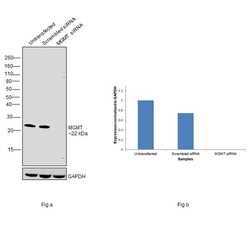
- Experimental details
- Knockdown of Methylated-DNA-protein-cysteine methyltransferase was achieved by transfecting HeLa with Methylated-DNA-protein-cysteine methyltransferase specific siRNAs (Silencer® select Product # s8752, s8750). Western Blot analysis (Fig. a) was performed using Nuclear enriched extracts from the Methylated-DNA-protein-cysteine methyltransferase knockdown cells (lane 3), non-targeting scrambled siRNA transfected cells (lane 2) and untransfected cells (lane 1). The Blot was probed with MGMT Monoclonal Antibody (MT 3.1) (Product # MA5-13506, 1:50 dilution) and Goat anti-Mouse IgG (H+L) Superclonal™ Recombinant Secondary Antibody, HRP (Product # A28177, 1:4000 dilution). Densitometric analysis of this western Blot is shown in histogram (Fig. b). Decrease in signal upon siRNA mediated knock down confirms that antibody is specific to Methylated-DNA--protein-cysteine methyltransferase.
- Submitted by
- Invitrogen Antibodies (provider)
- Main image
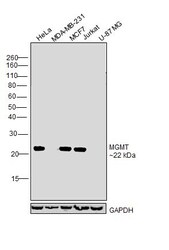
- Experimental details
- Western Blot was performed using Anti-MGMT Monoclonal Antibody (MT 3.1) (Product # MA5-13506) and a 22 kDa band corresponding to Methylated-DNA-protein-cysteine methyltransferase was observed across positive cell lines (HeLa, MCF7 and Jurkat); and not in negative cell lines (MDA-MB-231 and U-87 MG) tested. Nuclear enriched extracts (30 µg lysate) of HeLa (Lane 1), MDA-MB-231 (Lane 2), MCF7 (Lane 3), Jurkat (Lane 4) and U-87 MG (Lane 5) were electrophoresed using NuPAGE™ 12% Bis-Tris Protein Gel (Product # NP0341BOX). Resolved proteins were then transferred onto a Nitrocellulose membrane (Product # IB23001) by iBlot® 2 Dry Blotting System (Product # IB21001). The Blot was probed with the primary antibody (1:50 dilution) and detected by chemiluminescence with Goat anti-Mouse IgG (H+L) Superclonal™ Recombinant Secondary Antibody, HRP (Product # A28177, 1:4000 dilution) using the iBright FL 1000 (Product # A32752). Chemiluminescent detection was performed using Novex® ECL Chemiluminescent Substrate Reagent Kit (Product # WP20005).
Supportive validation
- Submitted by
- Invitrogen Antibodies (provider)
- Main image
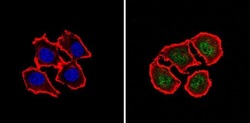
- Experimental details
- Immunofluorescent analysis of MGMT (O-methylguanine-DNA methyltransferase) (green) showing staining in the nucleus and cytoplasm of MCF-7 cells (right) compared to a negative control without primary antibody (left). Formalin-fixed cells were permeabilized with 0.1% Triton X-100 in TBS for 5-10 minutes and blocked with 3% BSA-PBS for 30 minutes at room temperature. Cells were probed with a MGMT monoclonal antibody (Product # MA5-13506) in 3% BSA-PBS at a dilution of 1:20 and incubated overnight at 4 ºC in a humidified chamber. Cells were washed with PBST and incubated with a DyLight-conjugated secondary antibody in PBS at room temperature in the dark. F-actin (red) was stained with a fluorescent red phalloidin and nuclei (blue) were stained with Hoechst or DAPI. Images were taken at a magnification of 60x.
- Submitted by
- Invitrogen Antibodies (provider)
- Main image
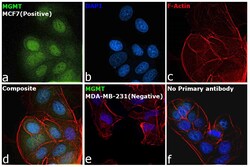
- Experimental details
- Immunofluorescence analysis of Methylated-DNA-protein-cysteine methyltransferase was performed using 70% confluent log phase MCF7 cells. The cells were fixed with 4% paraformaldehyde for 10 minutes, permeabilized with 0.1% Triton™ X-100 for 15 minutes, and blocked with 2% BSA for 45 minutes at room temperature. The cells were labeled with MGMT Monoclonal Antibody (MT 3.1) (Product # MA5-13506) at 1:100 dilution in 0.1% BSA, incubated at 4 degree celsius overnight and then labeled with Goat anti-Mouse IgG (H+L) Highly Cross-Adsorbed Secondary Antibody, Alexa Fluor Plus 488 (Product # A32723), (1:2000 dilution), for 45 minutes at room temperature (Panel a: Green). Nuclei (Panel b: Blue) were stained with SlowFade® Gold Antifade Mountant with DAPI (Product # S36938). F-actin (Panel c: Red) was stained with Rhodamine Phalloidin (Product # R415, 1:300 dilution). Panel d represents the merged image showing nucleus and cytoplasm localization. Panel e represents MGMT (Negative model). Panel f represents control cells with no primary antibody to assess background. The images were captured at 60X magnification.
Supportive validation
- Submitted by
- Invitrogen Antibodies (provider)
- Main image
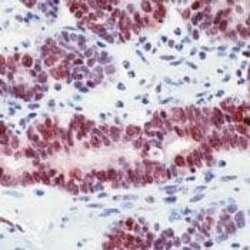
- Experimental details
- Formalin-fixed, paraffin-embedded human colon carcinoma stained with MGMT antibody using peroxidase-conjugate and AEC chromogen. Note nuclear staining of tumor cells.
Supportive validation
- Submitted by
- Invitrogen Antibodies (provider)
- Main image
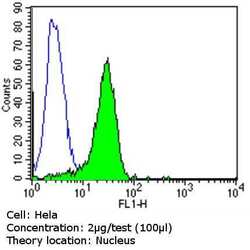
- Experimental details
- Flow cytometry analysis of MGMT (O-methylguanine-DNA methyltransferase) in Hela cells (green) compared to an isotype control (blue). Cells were harvested, adjusted to a concentration of 1-5x10^6 cells/mL, fixed with 2% paraformaldehyde and washed with PBS. Cells were blocked with a 2% solution of BSA-PBS for 30 min at room temperature and incubated with a MGMT (O-methylguanine-DNA methyltransferase) monoclonal antibody (Product # MA5-13506) at a dilution of 2 µg/test for 60 min at room temperature. Cells were then incubated for 40 min at room temperature in the dark using a Dylight 488-conjugated goat anti-mouse IgG (H+L) secondary antibody and re-suspended in PBS for FACS analysis.
- Submitted by
- Invitrogen Antibodies (provider)
- Main image
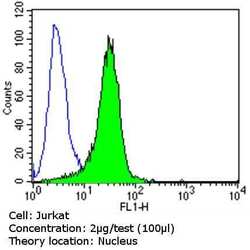
- Experimental details
- Flow cytometry analysis of MGMT (O-methylguanine-DNA methyltransferase) in Jurkat cells (green) compared to an isotype control (blue). Cells were harvested, adjusted to a concentration of 1-5x10^6 cells/mL, fixed with 2% paraformaldehyde and washed with PBS. Cells were blocked with a 2% solution of BSA-PBS for 30 min at room temperature and incubated with a MGMT (O-methylguanine-DNA methyltransferase) monoclonal antibody (Product # MA5-13506) at a dilution of 2 µg/test for 60 min at room temperature. Cells were then incubated for 40 min at room temperature in the dark using a Dylight 488-conjugated goat anti-mouse IgG (H+L) secondary antibody and re-suspended in PBS for FACS analysis.
 Explore
Explore Validate
Validate Learn
Learn Western blot
Western blot